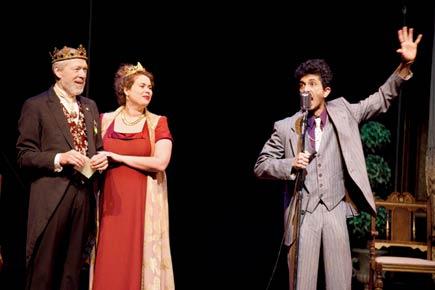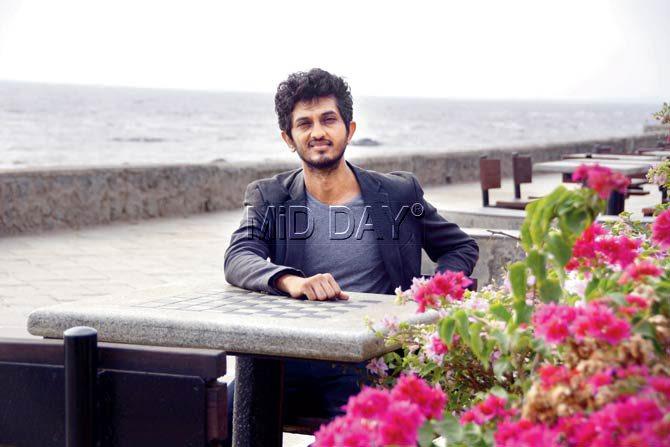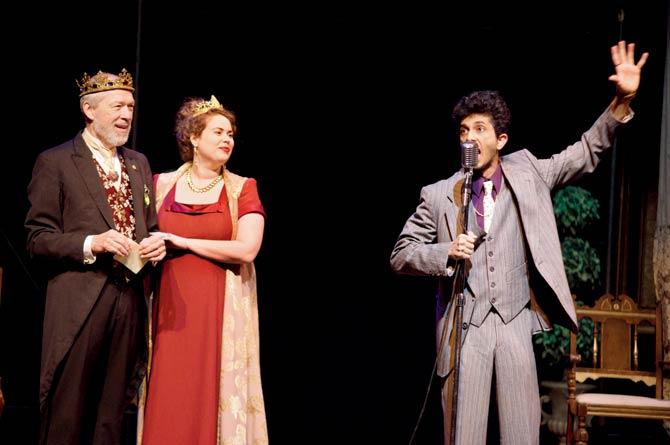With his radio play on William Shakespeare, theatre actor and director Deshik Vansadia aims to bring the playwright alive for India

Ten years ago, playwright and theatre actor Deshik Vansadia — then in his early 20s — chanced upon a book by renowned American acting coach Stella Adler, titled, The Art of Acting. “When I read Adler’s book, I knew this was exactly what I wanted to do,” he recalls. But, having been raised in a traditional Gujarati household in the small town of Navsari, he was aware that his plans wouldn’t quite take flight. “Unless I ran away from home,” he says, as he holds back that sheepish grin. “And I kind of did that...”
ADVERTISEMENT

Pic/Pradeep Dhivar
Today, as Mumbai-based Vansadia looks back at that moment, he has no regrets. The 32-year-old has just wrapped up the recording of his radio play — William Shakespeare’s Measure for Measure — for All India Radio (AIR). The play is already on air, and will be broadcast through May to mark the writer’s 400th death anniversary. Vansadia, who is an alumnus of the Stella Adler Academy of Acting (Los Angeles) and Shakespeare and Company (Massachusetts), remembers lying to his parents about pursuing a Masters in Engineering in the US. He left home for LA soon after, but was forced to bag his engineering degree when a friend of the family, spilled the beans on him.
 Vansadia performing a scene from Shakespeare’s Cymbeline
Vansadia performing a scene from Shakespeare’s Cymbeline
That didn’t hold him back. “I enrolled into acting school after completing my masters,” he adds.
But it was only in 2010 that Vansadia found his true calling. Bagging the lead role of Romeo in the Shakespearian tragedy, Romeo and Juliet did the trick.
“It was a life-changing experience,” he says. “Growing up in Gujarat, I remember being timid. Now, here, I was playing Romeo on stage, and speaking passionate, bold and vulnerable lines. It robbed me of my shy self and made me more open to approaching women. Thanks to Shakespeare… I was a whole new being,” says Vansadia.
What pulled Vansadia to the literary genius’ masterpieces was the language. “Shakespeare’s language is so human that it makes it very easy to connect with. And his characters are relatable. Though they were written hundreds of years ago, they still feel real,” adds Vansadia.
When Vansadia returned to India three years ago, he only had one mission at hand. “I wanted to bring more of Shakespeare to India,” he says, adding that there is a dearth of original works of the playwright being performed in India.
He is especially unhappy about the many Shakespearean adaptations on celluloid. “None of Shakespeare’s stories were original. They were either borrowed or stolen from works of other playwrights. What he brought to these stories was the language.
“If you do Shakespeare and don’t use his language, then you are technically doing an old Elizabethan play,” he argues.
Since 2013, Vansadia has been actively engaged with several schools in the city, where he has been teaching and directing Shakespeare’s plays.
He has also been involved with the Drama School of Mumbai, and directed a production of Shakespeare for the theatre company Ninasam in Heggodu, Karanataka, called The Asylum of Shakespeare. There, the company brought together all the mad characters — Hamlet, King Lear, Ophelia, Lady Macbeth among others — etched by the playwright.
In March, when he was approached to direct and act in a play for AIR, Vansadia thought it to be the perfect platform to showcase Shak-espeare’s work. The play went on air in the last week of April. “On radio, everything has to be expressed through the voice. I ensured that I didn’t change the language, but added a narrator, to link one scene with the other, so that the audience knew what was happening,”
he says.
Following the response he got for his radio play, he hopes that the original works of Shakespeare are received with greater enthusiasm, and performed across all platforms. “His language needs to live.”
 Subscribe today by clicking the link and stay updated with the latest news!" Click here!
Subscribe today by clicking the link and stay updated with the latest news!" Click here!






